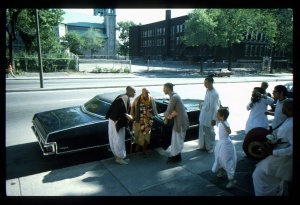SB 7.11.32: Difference between revisions
m (1 revision(s)) |
Tejaashvini (talk | contribs) No edit summary |
||
| Line 1: | Line 1: | ||
{{info | {{info | ||
|speaker= | |speaker=Nārada Muni | ||
|listener=King | |listener=King Yudhiṣṭhira | ||
}} | }} | ||
[[Category:Srimad-Bhagavatam - Canto 07 Chapter 11]] | |||
[[Category:Bhagavatam Verses Spoken by Narada Muni - Vanisource|071132]] | |||
<div style="float:left">'''[[Srimad-Bhagavatam]] - [[SB 7|Seventh Canto]] - [[SB 7.11: The Perfect Society: Four Social Classes|Chapter 11: The Perfect Society: Four Social Classes]]'''</div> | |||
<div style="float:right">[[File:Go-previous.png|link=SB 7.11.31]] '''[[SB 7.11.31]] - [[SB 7.11.33-34]]''' [[File:Go-next.png|link=SB 7.11.33-34]]</div> | |||
{{RandomImage}} | |||
==== TEXT 32 ==== | ==== TEXT 32 ==== | ||
<div | <div class="verse"> | ||
vṛttyā sva-bhāva-kṛtayā | :vṛttyā sva-bhāva-kṛtayā | ||
vartamānaḥ sva-karma-kṛt | :vartamānaḥ sva-karma-kṛt | ||
hitvā sva-bhāva-jaṁ karma | :hitvā sva-bhāva-jaṁ karma | ||
śanair nirguṇatām iyāt | :śanair nirguṇatām iyāt | ||
</div> | </div> | ||
| Line 17: | Line 22: | ||
==== SYNONYMS ==== | ==== SYNONYMS ==== | ||
<div | <div class="synonyms"> | ||
''vṛttyā''—with the profession; ''sva-bhāva-kṛtayā''—performed according to one's modes of material nature; ''vartamānaḥ''—existing; ''sva-karma-kṛt''—executing his own work; ''hitvā''—giving up; ''sva-bhāva-jam''—born from one's own modes of nature; ''karma''—activities; ''śanaiḥ''—gradually; ''nirguṇatām''—transcendental position; ''iyāt''—may attain. | |||
</div> | </div> | ||
| Line 24: | Line 29: | ||
==== TRANSLATION ==== | ==== TRANSLATION ==== | ||
<div | <div class="translation"> | ||
If one acts in his profession according to his position in the modes of nature and gradually gives up these activities, he attains the niṣkāma stage. | If one acts in his profession according to his position in the modes of nature and gradually gives up these activities, he attains the niṣkāma stage. | ||
</div> | </div> | ||
| Line 31: | Line 36: | ||
==== PURPORT ==== | ==== PURPORT ==== | ||
<div | <div class="purport"> | ||
If one gradually gives up his hereditary customs and duties and tries to serve the Supreme Personality of Godhead in his natural position, he is gradually able to become free from these activities, and he attains the stage of niṣkāma, freedom from material desires. | If one gradually gives up his hereditary customs and duties and tries to serve the Supreme Personality of Godhead in his natural position, he is gradually able to become free from these activities, and he attains the stage of ''niṣkāma,'' freedom from material desires. | ||
</div> | </div> | ||
__NOTOC__ | |||
<div style="float:right; clear:both;">[[File:Go-previous.png|link=SB 7.11.31]] '''[[SB 7.11.31]] - [[SB 7.11.33-34]]''' [[File:Go-next.png|link=SB 7.11.33-34]]</div> | |||
__NOTOC__ | |||
__NOEDITSECTION__ | |||
Revision as of 15:52, 31 May 2021

A.C. Bhaktivedanta Swami Prabhupada
TEXT 32
- vṛttyā sva-bhāva-kṛtayā
- vartamānaḥ sva-karma-kṛt
- hitvā sva-bhāva-jaṁ karma
- śanair nirguṇatām iyāt
SYNONYMS
vṛttyā—with the profession; sva-bhāva-kṛtayā—performed according to one's modes of material nature; vartamānaḥ—existing; sva-karma-kṛt—executing his own work; hitvā—giving up; sva-bhāva-jam—born from one's own modes of nature; karma—activities; śanaiḥ—gradually; nirguṇatām—transcendental position; iyāt—may attain.
TRANSLATION
If one acts in his profession according to his position in the modes of nature and gradually gives up these activities, he attains the niṣkāma stage.
PURPORT
If one gradually gives up his hereditary customs and duties and tries to serve the Supreme Personality of Godhead in his natural position, he is gradually able to become free from these activities, and he attains the stage of niṣkāma, freedom from material desires.